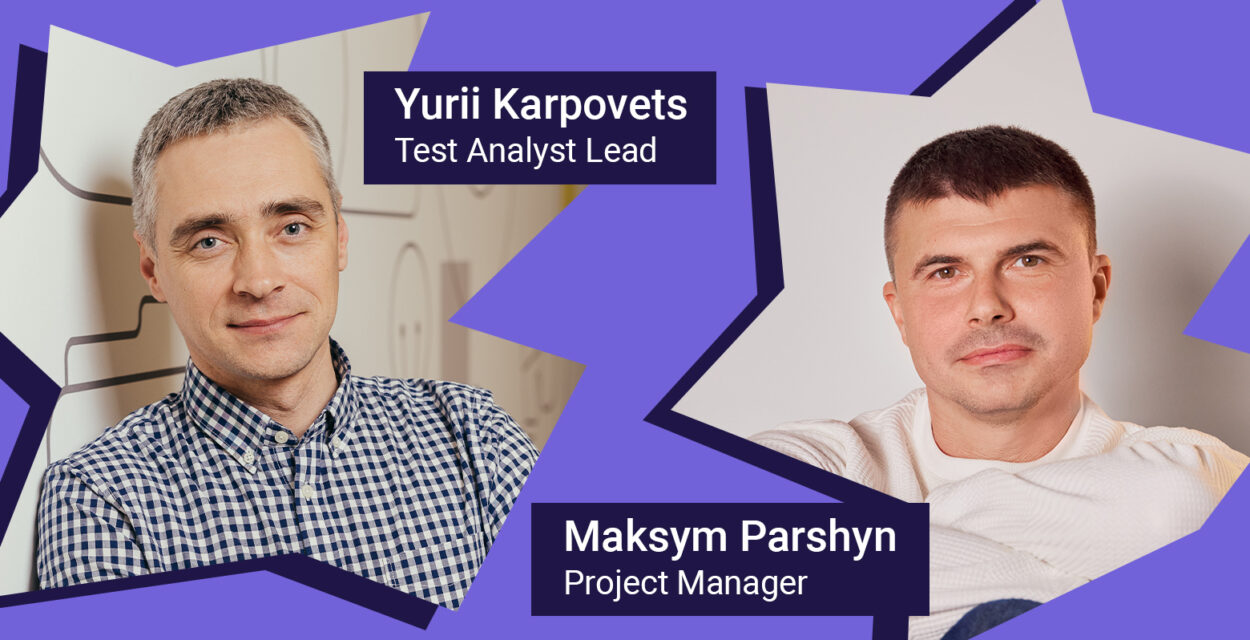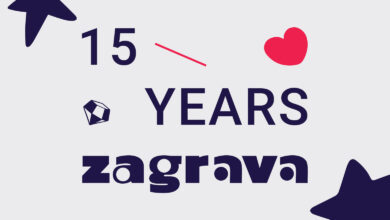Level by level: 2 stories of Zagrava employees about a successful career in game development from scratch

Is it really possible to get into a team that creates world-class games without specialized experience and skills? So if you follow the new vacancies of Zagrava, game development studio from Rivne, which is part of the international company Playrix. The studio is growing and looking for talent without any preconceptions.
The editorial staff of the online magazine The Point tells the success stories of Zagrava employees who started their way in the gaming industry from a starting position.
Maxim Parshyn, Project Manager, Zagrava
I joined the team seven years ago due to a happy combination of circumstances: the company “on yesterday” was looking for a tester, and I was looking for a job. I wanted to work in IT for a long time, but I had no experience and skills. This was my chance – and I took it.
The position of a tester is often the first step of an IT career. At the same time, it is an extremely convenient role for starting development. After all, the QA specialist studies the game and its creation process from start to finish. I turned to various specialists-from artists to programmers – to clarify incomprehensible questions. And when I started to get a good feel for the game, my colleagues came to me for advice. Gradually, I mastered the skills required for a level designer, and on the next project (developing a game based on Match3 mechanics), I combined two roles.
Subsequently, the producer of one of the Escape projects went to study in Malaysia for three months, and I was offered to replace him. The new role, in addition to coordinating the team, required various skills: in level, game and sound design, as well as in “native” testing for me. At first, it was not easy and I didn’t know if I could successfully hold several professional positions. But when I went this way, I understood: nothing is impossible – there would be a desire.
Not only practice and the opportunity to learn at the expense of the company, but also well-established communication in the team helps you grow quickly. In Zagrava, no one is ever left on their own with a problem.
You can always contact your colleagues and be sure that they will support you in finding a solution. The entire team is a “collective mentor”, happy to share tips and life hacks.
Each employee has many opportunities for development. When a new vacancy appears, anyone can try their hand – in particular, applications are regularly submitted to the testing department. Many colleagues, on their own initiative, receive additional training – for example, in programming, graphics, working with texts, and “test” new roles in areas that are interesting to them.
I am now a Project Manager for a co-development company that produces content for one of the Playrix games. I work with a team that creates new features: I organize processes, establish communication, monitor the completion of tasks and meet deadlines.
I’m not a careerist. I did not have a goal to grow to a leadership position, although now I understand that this particular direction is “mine”. Development in the company took place gradually and organically: you want to learn something new and understand certain issues in more detail, but therefore you are ready for more complex tasks and are ready for a new stage. I tried myself in several game developmental areas; I know different processes and understand how they relate to each other. This is useful for the role of a manager: I know how long it takes to complete a certain task and what problems arise. This helps you work more effectively with teams.
Many newcomers join us, including those without experience. I appreciate it when a person first tries to figure out the issue on their own – it’s always noticeable. But I am always ready to help you find the answer or the right specialist for consultation, because at the start they supported me as well. Since the company stands for development, including in new directions, managers also support this desire in their teams. This means that they are ready to quickly search for new talents for the position, and they are released.
I already have specialized experience, so the lack of skills would not be an obstacle to finding a new job: there are many vacancies on the market. However, I am not sure that other employers care about the team as much as Zagrava, and share the values that are close to me – honesty and decency. Therefore, I plan to develop here in the future.
Yurii Karpovets, QA manager, Zagrava (Playrix)
I have been interested in computer games since childhood: mobile games appeared much later. My peers and I started exploring this fascinating world with the first consoles – first Atari and Dendy, then Sega, Nintendo and PlayStation. It was always interesting to go through a new game from start to finish and to understand how it works. However, time does not stand still – we have matured, we all have families, obligations and jobs. For a long time, I worked in various professional fields that are very far from game development, for example, in the field of finance. Many of my friends and acquaintances have connected their lives with IT, some of them with the gaming industry, others, by the way, work in Zagrava. I followed their development and enjoyed the company’s success. However, I did not dare to change my profession radically. However, I continued to be interested in the gaming industry – I followed the latest developments, for personal development, in my spare time, I took various online courses. During my self-education, I was very interested in the software testing (QA) industry – I realized that a tester, as a technical specialist, has a unique opportunity to understand all aspects of the game creation process. I realized that as a perfectionist, I could do this job well.
More than a year ago, a friend shared information that a vacant position of a QA engineer in the Testing Department was available in Zagrava. I realized that I was mentally ready for change, this is the chance, and I put aside my doubts. I applied, passed a series of interviews, and then got the opportunity to try my hand as a technical specialist during a probationary period. Now I am well aware that it was a difficult, but very important period, during which I formed a baggage of important professional knowledge, skills and abilities. I am sure that it was thanks to the fruitful team work on solving various tasks, the support of colleagues in the Department and directly from my mentor that I managed to do this! That’s how I joined the testing team for the Junior QA position. I am very grateful to Zagrava for this opportunity.
Subsequently, our company underwent an internal transformation and the question arose about creating a new role – a test department manager who performs the functions of a Team Lead team: responsible for creating and coordinating mini-teams in the department, distributing tasks among colleagues, building new processes, recruiting, mentoring and developing specialists. I decided to try myself as a team manager, where I grew up professionally and still work today. Zagrava supported my commitment.
In general, a QA engineer is a very good position to start a career, because a tester sees the result of the entire team’s work – programmers, artists, game designers, project managers, producers, and so on. Understands the sequence, relationships and makes sure that the result of all areas of work is successfully compiled and worked in the game. This allows a specialist in the testing department to understand and realize exactly what direction they might be interested in and where, taking into account their preferences and skills, they can grow in the future.
The classic path of professional development in IT-growth from Junior to Senior positions with the acquisition of experience and technical skills. The testing segment is no exception, although it has its own characteristics. In general, QA engineers have the opportunity to develop according to one of three development scenarios. The first one is based on hard skills – this is an opportunity to grow as a technical specialist, complete additional training and become a developer, or move into the direction of testing automation, performance testing or interface usability, that is, narrow specializations in the field of QA. The second option is to radically change the direction of your activity, complete additional training and become, for example, a game designer, 2D or 3D artist or animator, and so on.
The third option is the development of soft skills and managerial competencies, including: team planning, monitoring tasks and meeting deadlines, communication, team building, motivation, and responsibility for the result of work (not only personal, but also for the entire team). I decided to choose this particular development option.
Team work motivates development – when a lot of people are working on a project, the tasks are urgent, but together we manage to do everything and “even more” and release a cool product to the world. I feel euphoric at such moments.
And then I see people-for example, in transport, playing a game that the team and I have worked so hard on for so long… I’m proud of it.
Together with our team, we are constantly learning – mastering new technical skills and solving new types of problems, studying and updating the knowledge base available to us. Together with the team, I continue to learn by myself. In particular, to be more productive in my new role, I take online courses for IT managers. I try not to forget about hard skills, because one of my tasks as a Department Manager is to support and transfer experience to the newcomers who have a lot of questions at the start of their career, just like I did in my time. I believe that training in our industry should never be stopped – it is a continuous process, otherwise it will just be stupid in one place. I appreciate that the company is interested and always supports the team in their desire to develop. Zagrava offers training to all interested employees. The specialist can choose an interesting course and pay a small part (within 10-15%) for it. We can buy any specialized literature – we read it for the whole department, and then discuss it. We attend professional events, mostly online now, to keep up to date with the latest trends.
My expectations from working in game development were more than just fulfilled. Yes, it was not easy, especially at first, but this stage is necessary to “turn on” and reach the level of independent high-quality work. If I had to make a choice again – I would take another chance and change my profession to this one. I advise anyone who is interested in the gaming industry, but doubts, to try their hand. Perhaps it will also become a life’s work for you-as it is for me. Everything is in your hands!


